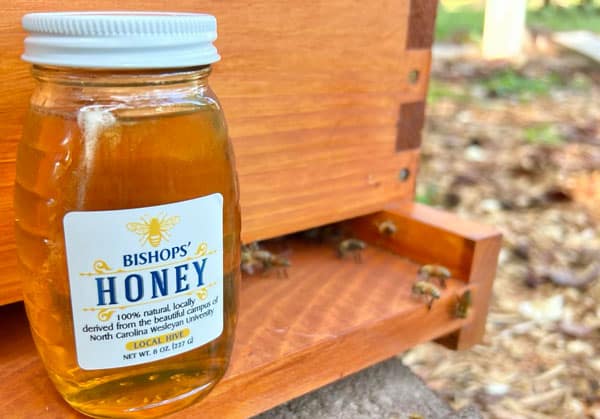Beginning this month, North Carolina Wesleyan University commenced offering its own local honey for purchase on campus and online. The University’s “B” Club, in a group effort, extracts honey from pollinator garden hives located at the back of campus. The honey is harvested 2-3 times per year. As of 2023, the hives have yielded close to 60-70 pounds of fresh, local honey. Bishop honey is being sold in 8 oz. jars for $6.95 in the Rachel T. Dix Bookstore located in the Hardee’s Student Union on campus.

NC Wesleyan recently became an affiliate of the Bee Campus USA program, designed to marshal the strengths of educational campuses for the benefit of pollinators. NC Wesleyan strives to maintain biodiversity throughout its campus and recognizes the vital role bees play in our ecosystem.
With the help of Dr. Carl Lewis, NCWU’s Bee Campus USA Program Coordinator and Assistant Professor of Criminal Justice, Wesleyan has created and maintained a pollinator garden for the past several years which is currently home to three active bee hives. The concept of having bee hives on campus was the result of the work of alumna, Carolynn Davern ’18. Caitlin BrabbleRose ‘18, along with several other founding members, helped create The B Club during their time at Wesleyan. This student organization, led by Dr. Ayra Sundbom, allows students to perform research while learning about animals and biodiversity. The “B” in B Club stands for more than just bees— Bees, Bats, Birds, Butterflies and Beasts.
“Being able to offer honey for sale to the public is a goal the University has been working toward for quite a while. I’m happy with the success that we’ve seen with the hives on campus and hope to see more students get involved with the sustainability efforts of the B Club in the upcoming year,” stated Dr. Carl Lewis, NCWU’s Bee Campus USA Program Coordinator and Assistant Professor of Criminal Justice.
The University takes pride in its commitment to minimizing hazards to pollinators by using nearly no neonicotinoids or other potentially dangerous pesticides. To learn more about North Carolina Wesleyan University’s Bee Campus USA program, visit ncwu.edu/bee-campus and purchase honey at ncwustore.com.




